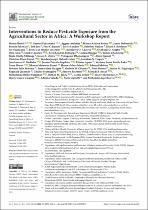| dc.contributor.author | Röösli, Martin | |
| dc.contributor.author | Fuhrimann, Samuel | |
| dc.contributor.author | Maree, Liana | |
| dc.date.accessioned | 2022-08-16T09:09:32Z | |
| dc.date.available | 2022-08-16T09:09:32Z | |
| dc.date.issued | 2022 | |
| dc.identifier.citation | Röösli, M. et al. (2022). Interventions to reduce pesticide exposure from the agricultural sector in Africa: A workshop report. International Journal of Environmental Research and Public Health, 19(15), 8973. https://doi.org/10.3390/ijerph19158973 | en_US |
| dc.identifier.issn | 1660-4601 | |
| dc.identifier.uri | https://doi.org/10.3390/ijerph19158973 | |
| dc.identifier.uri | http://hdl.handle.net/10566/7737 | |
| dc.description.abstract | Despite the fact that several cases of unsafe pesticide use among farmers in different parts
of Africa have been documented, there is limited evidence regarding which specific interventions are
effective in reducing pesticide exposure and associated risks to human health and ecology. The overall
goal of the African Pesticide Intervention Project (APsent) study is to better understand ongoing
research and public health activities related to interventions in Africa through the implementation
of suitable target-specific situations or use contexts. A systematic review of the scientific literature
on pesticide intervention studies with a focus on Africa was conducted. This was followed by
a qualitative survey among stakeholders involved in pesticide research or management in the
African region to learn about barriers to and promoters of successful interventions. | en_US |
| dc.language.iso | en | en_US |
| dc.publisher | MDPI | en_US |
| dc.subject | Pesticides | en_US |
| dc.subject | Africa | en_US |
| dc.subject | Environmental health | en_US |
| dc.subject | Occupational health | en_US |
| dc.subject | Bioscience | en_US |
| dc.subject | Agricultural sector | en_US |
| dc.title | Interventions to reduce pesticide exposure from the agricultural sector in Africa: A workshop report | en_US |
| dc.type | Article | en_US |

